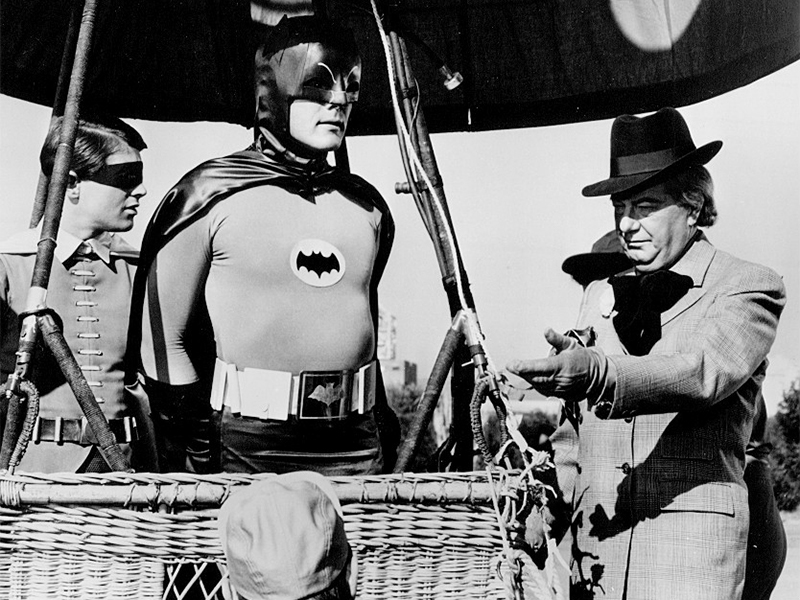(RNS) This past weekend, many of us lost a piece of our childhood.
I am referring to the death of Adam West, whose most famous role was as Batman in the television series that ran from 1966-1968.
We loved the show — despite the fact that there was something famously ridiculous and campy about it.
As a young boy, I loved comic books and superheroes. Among my friends, there was a constant debate: Who was better — Superman or Batman?
In my mind, Batman won. Hands down.
Why?
Because in the entire pantheon of superheroes — Superman, Flash, the Green Lantern, Spider-Man, Aquaman, Wonder Woman, to name a few — Batman was unique.
He was the only one who didn’t have any superpowers.
Oh, sure, he was in good physical shape.
But, what I liked the most about Batman was that he was very smart, and very rich, and had all sorts of cool gadgets.
I could not have known this at the time, but Batman was also very “Jewish.”
Why do I say that?
First of all, let’s go back to the very origins of the superhero industry in the United States.
It was a Jewish business. Superman was created by Joe Shuster and Jerry Siegel. Stan Lee created Spider-Man, the Hulk and the Fantastic Four.
Batman was the brainchild of Bob Kane — born Robert Kahn in 1915.
But, beyond the fact that his creator was Jewish, what was so “Jewish” about Batman?
First, he was a survivor.
So was Superman, of course — a refugee from a dying planet, adopted by a childless couple (with echoes of the biblical Moses story) — the ultimate immigrant success story.
Not to mention that Clark Kent works in a profession favored by many other Jews — as a mild-mannered reporter for a great metropolitan newspaper.
But, with Batman, it was different. Yes, there was a trauma — but a much deeper one.
Batman began as Bruce Wayne, who, as a child, saw his parents killed before his eyes by a robber.
Even as a kid, I sensed Batman carried something dark within his psyche (the “dark knight,” indeed). There was something in him that was driven, obsessed and haunted.
Many observers have noticed that the Jewish-created superheroes emerged in the shadows of World War II and that their original mission was to fight the Nazis.
Consider this: Batman emerged in 1939.
As Kane’s pen was hitting the paper, I wonder if he was thinking of the Jewish children who were seeing their parents killed before their eyes — in concentration camps and ghettos that had just begun to crop up across Europe?
In that sense, Bruce Wayne/Batman was a stand-in for countless Jewish children who emerged from the war years deeply damaged by what they had witnessed.
There was a second Jewish resonance in Batman — and, in fact, in all superheroes.
They had secret identities.
Even as a young fan of superheroes, I realized that the notion of a secret identity was simultaneously laughable — and enticing.
Laughable: My prepubescent friends and I realized how absurd the whole thing was. Did no one realize that Superman was, in fact, Clark Kent? Did Kent’s glasses really serve as a sufficient mask?
Batman, as well. Did no one figure out that he had the same voice as Bruce Wayne? Especially because they hung out with the same people?
How stupid could the good citizens of Metropolis and Gotham City have been?
Enticing: Secret identities are deeply Jewish — going all the way back to the Torah itself.
Think of how many biblical stories feature people who have disguised themselves. In the book of Genesis alone:
- Jacob disguises himself as his hairy, tough twin, Esau.
- Tamar disguises herself as a prostitute to entice and expose Judah.
- Joseph essentially disguises himself as an Egyptian to fool his brothers.
In each case, we have to ask ourselves: Did the deceptions really work?
Fast-forward in Jewish history.
The conversos, the secret Jews of Spain, had to masquerade as Christians, while maintaining Jewish customs in secret. What was the secret identity — the Jew, or the Christian?
And modern assimilated Jews?
The ultimate, ironic silliness: Did Jews really think that if they changed their names, or had cosmetic surgery, and tried to blend into gentile society, that they could somehow “pass”?
Exactly whom did those Jews think they were fooling?
A sophisticated, assimilated German Jew is having coffee with a man who has a hunchback. “I used to be Jewish,” the Jew says.
“And I used to be a hunchback,” the hunchback snarkily replies.
Come to think of it — Bob Kane, the creator of Batman, started his life as Robert Kahn.
Did “Kane” mask the ancient priestly reality of “Kahn”? Was Kane creating a mask for himself as well?

Burt Ward as Robin, left, Adam West as Batman and Maurice Evans as The Puzzler from the television series “Batman” in the episode “The Puzzles Are Coming.” Photo courtesy of Creative Commons/ABC
Back to Adam West.
True, he lived to a grand old age. Eighty-eight years is a good run.
But, like his most famous role, there was a sadness within him as well.
Those two years as Batman — 1966 to 1968 — stayed with him, perhaps longer than he would have liked. He was a talented actor, and yet, he could never really shed the role of Batman — at least, not in the public imagination, nor in the imagination of casting directors.
At the end of the day, West could never take off the mask.
(Rabbi Jeffrey K. Salkin is the spiritual leader of Temple Solel in Hollywood, Fla. He writes the “Martini Judaism” column for RNS)






